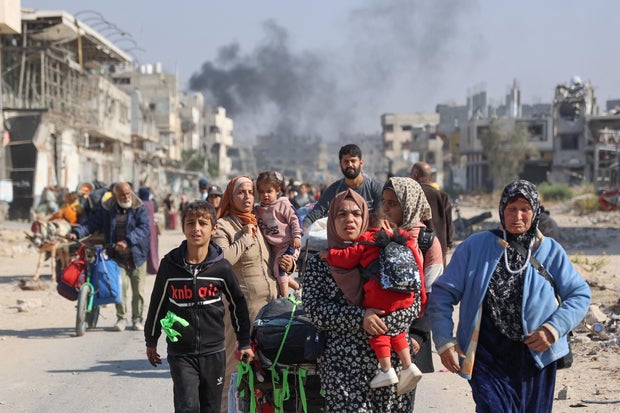Eight international aid groups have jointly rebuked Israel for not only failing “to meet any of the specific criteria” set out by the Biden administration in an Oct. 13 letter demanding that the U.S. ally drastically increase the flow of humanitarian aid into the Gaza Strip within 30 days, but accusing Israel of taking “actions that dramatically worsened the situation on the ground, particularly in Northern Gaza.”
The U.S. letter had threatened to cut off some U.S. military assistance to Israel if its demands were not met within 30 days — a deadline that has now passed.
“Israel’s actions failed to meet any of the specific criteria set out in the U.S. letter,” the eight humanitarian groups, including Save the Children and Oxfam, said in a joint assessment of Israel’s response to the U.S. demands.
The joint statement was published Tuesday as the U.S. State Department said it had assessed that Israel was not breaching U.S. laws on blocking aid supplies into Gaza, and that Israel had taken steps to address U.S. demands, so there would be no change in the ongoing provision of American weapons to Israel.
The aid groups’ report said the humanitarian “situation is in an even more dire state today than a month ago,” particularly in northern Gaza, which has faced the brunt of Israel’s ongoing war with the Iran-backed group Hamas.
“We’ve seen some progress being made,” State Department Spokesperson Vedant Patel said Tuesday. “We would like to see some more changes happen.”
Earlier this month, a United Nations-backed report warned of “an imminent and substantial likelihood of famine occurring, due to the rapidly deteriorating situation in the Gaza Strip.”
On Wednesday, Secretary of State Antony Blinken told journalists in Brussels that “this should be the time to end the war” in the Middle East, adding that Israel, “by the standards it set itself, has accomplished the goals that it set.”
In a statement also published Tuesday, the U.N.’s Office for the Coordination of Humanitarian Affairs said “conditions of life across Gaza are unfit for human survival,” warning that food supplies remained insufficient.
OCHA cited an increase in the “violent armed lootings of our convoys… driven by the collapse of public order and safety” in Gaza, but added that the primary issues in providing aid to Gaza’s more than 2 million people were “not logistical problems – they can be solved with the right political will.”
“Our capacity to respond is being undermined,” the agency said, specifically citing the Israeli parliament’s recent move to ban the U.N.’s own assistance agency for Palestinians, UNRWA, from operating in Gaza from January.
“If implemented, this bill will be another devastating blow to efforts to provide life-saving aid and avert the threat of famine,” OCHA said.





